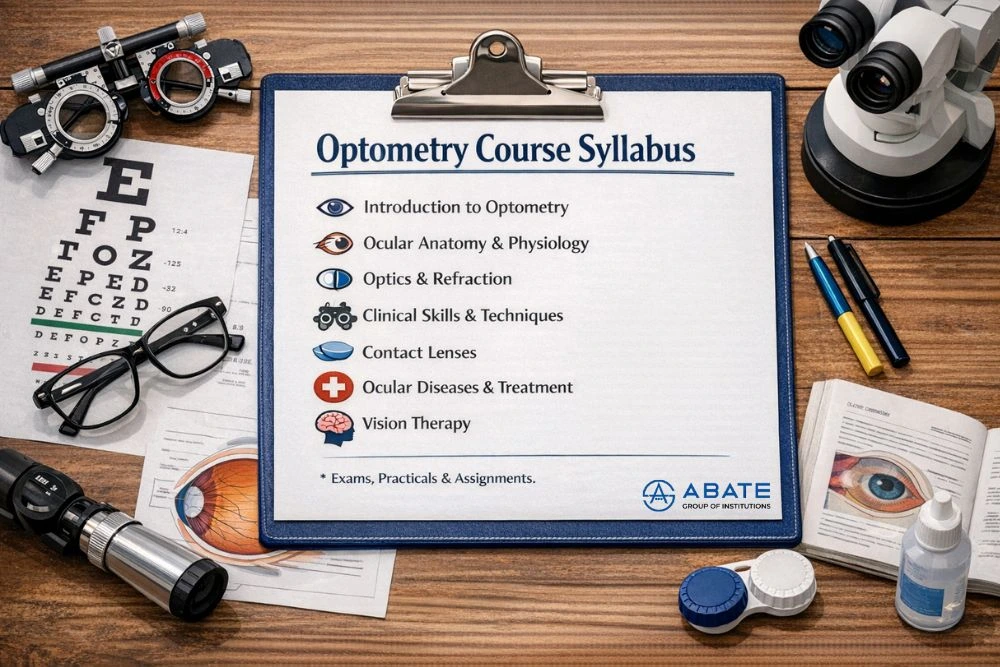Difference Between Optometry and Ophthalmology: A Complete Guide

Eye care involves many specialists, and two common professions in this field are optometry and ophthalmology. Though they both deal with eye health, their roles, training, and responsibilities are quite different. Understanding the difference between optometry and ophthalmology can help patients seek the right care and guide students in choosing the right career path.
What is Optometry?
Optometry focuses on eye health and vision care. Optometrists help people see better by identifying vision problems, prescribing glasses or contact lenses, and treating common eye conditions. They frequently serve as patients' initial point of contact and offer crucial eye care services. You can choose optometry colleges in Coimbatore to secure your career.
What Optometrists Do:
- Conduct regular eye check-ups
- Prescribe spectacles and contact lenses
- Determine problems such as eye discomfort or blurred vision.
- Treat minor conditions like dry eyes or allergies
- Give advice on visual therapy and eye workouts.
Optometrists also educate patients on maintaining eye health, including managing screen time, improving lighting conditions, and taking preventive measures against eye strain and fatigue. They may also collaborate with ophthalmologists and other medical professionals if a patient requires specialized or surgical treatment.
How to Become an Optometrist: In India, becoming an optometrist requires completing a B.Sc in Optometry, which includes four years of academic study followed by one year of hands-on clinical training. During the program, students learn anatomy, physiology, optics, and advanced techniques in eye examinations. Internships in eye hospitals or clinics are mandatory to gain real-time patient handling experience.
What is Ophthalmology?
Ophthalmology is a branch of medicine that deals with more advanced eye conditions. Ophthalmologists are medical professionals who perform surgeries as well as diagnose and treat complicated eye conditions. They are trained to handle everything from routine check-ups to eye operations.
What Ophthalmologists Do:
- Perform surgeries like cataract and LASIK
- Treat diseases like glaucoma or retinal disorders
- Use lasers and medications for treatment
- Treat eye issues associated with other medical diseases.
- Perform thorough eye exams and handle urgent situations.
Ophthalmologists are equipped to handle trauma cases, congenital eye diseases, and systemic illnesses that affect vision. Their ability to perform surgical procedures gives them a unique place in the field of eye care.
How to Become an Ophthalmologist: To practice ophthalmology in India:
- First, finish your MBBS program, which takes 5.5 years, including an internship.
- After that, seek a three-year ophthalmology specialisation (MD/MS).
Ophthalmologists are prepared to identify and treat a variety of ocular disorders by this demanding curriculum, which gives them extensive medical knowledge and surgical abilities.
Key Differences Between Optometry and Ophthalmology
|
Area |
Optometry |
Ophthalmology |
|
Education |
B.Sc in Optometry |
MBBS + MD/MS in Ophthalmology |
|
Role |
Vision care and eye exams |
Surgery and treatment of eye diseases |
|
Duration |
5 years (4 + 1 internship) |
8.5 years (MBBS + PG) |
|
Surgeries |
Not permitted |
Allowed |
|
Prescription |
Yes |
Yes |
|
Workplaces |
Clinics, optical shops, hospitals |
Hospitals, surgical centers, private practice |
Choosing the Right Career Path
Both optometry and ophthalmology are fulfilling career paths with growing demand. Your decision should depend on your interest, time investment, and long-term vision for your professional life.
Why Choose Optometry?
- A quicker path to starting your career
- Focus on vision correction and preventive care
- High demand in independent clinics, hospitals, and optical retail
- Work-life balance and consistent patient engagement
Why Choose Ophthalmology?
- A prestigious path for those interested in medicine and surgery
- Having the capacity to treat severe eye diseases
- Opportunities to work in large hospitals, medical colleges, or private practice
- High potential for specialization and career advancement
Career Scope in Optometry and Ophthalmology
Both professions offer excellent career opportunities in India and abroad. With the increasing use of digital devices, vision problems are more common than ever, increasing the need for optometrists. Similarly, the aging population and awareness of eye health are expanding the demand for skilled ophthalmologists.
Optometrists can work in:
- Eye hospitals
- Optical retail chains
- Vision therapy clinics
- Academic institutions
- Research and development
Ophthalmologists can pursue roles in:
- Super-specialty hospitals
- Government health services
- Private surgical centers
- Medical research and teaching
Optometry and Ophthalmology: Which is Better?
Knowing the difference between optometry and ophthalmology helps you choose the right eye care and a suitable profession in healthcare. Ophthalmologists address medical and surgical conditions, whereas optometrists assist patients with routine vision care.
If you're planning to build a career in eye care, consider pursuing a B.Sc Optometry program. Institutions like Abate Group of Institutions provide quality education, practical clinical exposure, and career support—making them a great choice for students who want to start strong in the world of vision care.

